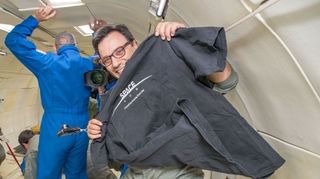
Space.com at 15: Thank You for Looking Up

It's funny how much things can change. Fifteen years ago, no one lived on the International Space Station. American space shuttles still soared in space. There were no working rovers on Mars, no orbiters around Mercury, Venus or Saturn. No lander on Titan. Space tourism was still only a dream. Voyager 1 had not yet reached interstellar space.
And now, as NASA celebrates the 45th anniversary the Apollo 11 moon landing, we at Space.com have our own celebration: It's our 15th birthday. And for that, Space Fans, we thank you.
The face of space travel is, as expected, a bit different now. As of today, humans have lived in space continuously for 14 years —more than 5,000 days, on the space station.
When Space.com launched on July 20, 1999, the Internet was its own strange new world on your desktop computer … or maybe a laptop. Today, my five-year-old daughter uses it to see the latest photos from Mars on a tablet.
Our pledge has always been simple: Something Amazing, Every Day. That is as true today as it was in 1999. And to be honest, when you're a space reporter, the amazing is not hard to find.
The night sky alone is filled with amazing sights, from planets and meteor showers to stars and comets. All you have to do is look up.
Every major planet in our solar system has been visited by space probes from Earth. By the time Space.com turns 16 in 2015, humanity's first robotic emissary to the dwarf planet Pluto (NASA's New Horizons probe) will have visited that distant, icy world, too.
Get the Space.com Newsletter
Breaking space news, the latest updates on rocket launches, skywatching events and more!
We have bridged the solar system from the sun to its outer edge … and beyond.

Of the two camps in space exploration (robotic probes vs. human astronauts), one thing is clear: exploring the universe is a human endeavor. It is humans that dream of exploring space, that build the telescopes, take the photos, assemble the rovers and — this part is important — vote to support their national space programs in pursuit of science, technology and a new understanding of our place in the universe.
At Space.com, we feel that space exploration is a voyage we are all taking, whether we know it or not. We live on one planet among billions in our galaxy, orbit an ordinary star in a universe of light. We are part of a truly cosmic neighborhood.
Only a select few, just over 500 people or so, have flown in space since the dawn of the human spaceflight in 1961. But hundreds of private citizens have booked tickets to ride a rocket ship with Virgin Galactic and XCOR Aerospace. It's clear we all want to go.
I think that's part our job, too. To share that voyage through the words, images and videos of the people and probes who have had the fortune to escape planet Earth, if only for a short time.
It's hard to know where we'll be in space in the next 15 years. Will it actually be an asteroid like NASA says? Or maybe the moon with Bigelow Aerospace, or maybe even a trip to Mars with SpaceX? I'm not sure. But I know I want to see it.
For everyone here at Space.com, these last 15 years have been one amazing star trek.
And we can't wait to see what's next.
Editor's note: This story was updated to correct that there was in fact a rover on Mars, Sojourner, in 1999, just not functioning. That rover ended its mission in 1997. Thanks to Jeffrey Patten for the spot! Email Tariq Malik at tmalik@space.com or follow him @tariqjmalik and Google+. Follow us @Spacedotcom, Facebook and Google+.
Join our Space Forums to keep talking space on the latest missions, night sky and more! And if you have a news tip, correction or comment, let us know at: community@space.com.

Tariq is the Editor-in-Chief of Space.com and joined the team in 2001, first as an intern and staff writer, and later as an editor. He covers human spaceflight, exploration and space science, as well as skywatching and entertainment. He became Space.com's Managing Editor in 2009 and Editor-in-Chief in 2019. Before joining Space.com, Tariq was a staff reporter for The Los Angeles Times covering education and city beats in La Habra, Fullerton and Huntington Beach. In October 2022, Tariq received the Harry Kolcum Award for excellence in space reporting from the National Space Club Florida Committee. He is also an Eagle Scout (yes, he has the Space Exploration merit badge) and went to Space Camp four times as a kid and a fifth time as an adult. He has journalism degrees from the University of Southern California and New York University. You can find Tariq at Space.com and as the co-host to the This Week In Space podcast with space historian Rod Pyle on the TWiT network. To see his latest project, you can follow Tariq on Twitter @tariqjmalik.
